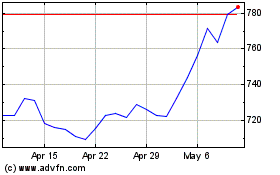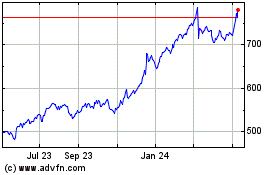Walmart to Develop Its Own Supply Chain for Angus Beef--Update
April 24 2019 - 4:10PM
Dow Jones News
By Micah Maidenberg
Walmart Inc. is pushing into the meat business, the latest
retailer to seek greater control and profits in the steaks and
rotisserie chickens that fill grocery-aisle meat cases.
The Arkansas-based chain will develop a network of cattle
ranches and meat-processing plants to provide Angus beef products
exclusively for its stores, a move Walmart said will provide the
company and its customers better visibility into their food
supply.
Walmart's move follows rival Costco Wholesale Corp.'s effort to
develop a poultry processing plant and dozens of supplier farms to
provide the chain's signature $4.99 rotisserie chickens. Walmart
and other chains already operate their own milk-processing plants
and bakeries.
Retailers' moves to take greater control of some commodity
processing come partly in response to consumers' growing focus on
how food is produced, with shoppers scrutinizing everything from
the fertilizer used on grain fields to drugs fed to chickens. The
efforts follow years of low crop prices, making it cheaper to raise
livestock and poultry.
"To answer our customer's demands, we need visibility into every
step in the supply chain," Scott Neal, a Walmart senior vice
president, said in prepared remarks.
Beyond reducing costs by handling processing and packaging
themselves, the retailers could also gain greater leverage in
negotiating supply deals with major U.S. meat companies like Tyson
Foods Inc., Cargill Inc. and Pilgrim's Pride Corp., analysts said.
The investments could also expose retailers to new risks, ranging
from animal diseases to meat plant worker safety.
Walmart's move "is definitely going to create some waves and may
change up the game a bit on the beef side, because traceability is
the next big thing," said Jeremy Scott, an analyst with Mizuho
Securities.
Tyson shares were down slightly in afternoon trading. Tyson
estimated that Walmart contributed 17% of its fiscal 2018 sales and
was the meat company's biggest single customer, according to a
November regulatory filing.
"Walmart is a great business partner of Tyson Foods, and we are
fully supportive of the project," a Tyson spokeswoman said.
Walmart's effort will focus on Angus beef cuts like steaks,
roasts and rib-eyes and will supply 500 stores in the
Southeast.
The company is partnering with Bob McClaren of 44 Farms and
Prime Pursuits, who will help Walmart find cattle; Creekstone
Farms, which will butcher the cattle at a Kansas facility, and FPL
Foods, which will pack the meat at a Georgia facility for delivery
to stores.
Costco is building a $450 million chicken slaughtering and
processing facility In Fremont, Neb., capable of processing two
million birds a week, churning out rotisserie chickens and other
poultry products to be sold under Costco's Kirkland brand. The
plant is slated to open in September, and will be supplied by 100
to 125 farms, according to a spokeswoman for Lincoln Premium
Poultry, which will manage the plant.
Building the plant will ensure a steady supply of chickens in
the specific sizes Costco sells, she said.
Executives for Pilgrim's, a chicken supplier to Costco, have
said Costco's move doesn't represent a threat and that the chain
had increased its business with Pilgrim's.
Such moves by retailers have bruised some suppliers. Walmart in
2018 opened its own milk-processing plant in Indiana, supplying
more than 600 stores previously supplied by U.S. milk company Dean
Foods Co. The move by Dean's biggest customer cost Dean roughly 100
million gallons of annual milk sales, at a time when milk
consumption generally has been declining.
Write to Micah Maidenberg at micah.maidenberg@wsj.com
(END) Dow Jones Newswires
April 24, 2019 15:55 ET (19:55 GMT)
Copyright (c) 2019 Dow Jones & Company, Inc.
Costco Wholesale (NASDAQ:COST)
Historical Stock Chart
From Mar 2024 to Apr 2024

Costco Wholesale (NASDAQ:COST)
Historical Stock Chart
From Apr 2023 to Apr 2024
